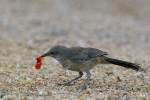Urbanization in the desert has changed the environment for native birds by transforming the vegetation structure, increasing access to water, and altering predation levels. Now, CAP researchers Dr. Pierre Deviche, Dr. Bobby Fokidis, and Ph.D. candidate Scott Davies are seeking to understand how urbanization affects birds and the mechanisms that drive bird behavior. They are particularly interested in the role that hormones play in controlling behaviors.
Recently published research from the Deviche lab at the University of Arizona in Tempe focuses on the territorial behavior of native birds in the city versus their desert counterparts and the relationships between this behavior, circulating hormones, and ecosystem structure. Fokidis, Deviche, and Miles Orchinik centered their investigations on males of two bird species found in the Sonoran Desert and the Phoenix metropolitan area, Abert’s Towhee (Melozone aberti) and the Curve-billed Thrasher (Toxostoma curvirostre). They recorded the two species’ responses to recorded bird calls that simulated an intrusion on territory.
Their findings suggest that urban birds exhibit more aggressive territorial behavior than their desert cousins. Such aggression can take the form of approaching the site of the intruder, song, calls, and raising wings. This behavior appears unrelated to blood levels of two hormones under investigation, plasma testosterone and corticosterone, which were thought to mediate territorial behaviors.
Instead, they found that Abert’s Towhees exhibited more aggressive territorial behavior in urban locations with a higher population density of towhees. Urban Curve-billed Thrashers, on the other hand, displayed more territorial behaviors in areas with a high proportion of desert vegetation such as cacti, mesquite, and cholla, which are important nest sites for this species. Both findings indicate that ecosystem structure plays a role in territorial behavior.
You can also watch the video describing this research at http://vimeo.com/23878881 and read a out related research at http://caplter.asu.edu/docs/symposia/symp2011/Davies_Deviche.pdf.
Reference
Fokidis, H.B., M. Orchinik, and P. Deviche. 2011. Context-specific territorial behavior in urban birds: No evidence for involvement of testosterone or corticosterone. Hormones and Behavior 59: 133-143 (see http://www.sciencedirect.com/science/article/pii/S0018506X10002837

 Enlarge this image
Enlarge this image